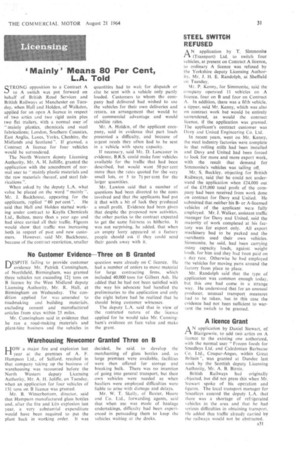' Mainly' Means 80 Per Cent, L.A. Told S TRONG opposition to
Page 35

If you've noticed an error in this article please click here to report it so we can fix it.
a Contract A to A switch was put forward on behalf of British Road Services and British Railways at Manchester on Tuesday, when Hall and Holden, of Walkden, applied for an open A licence in respect of two artics and two rigid units plus two flat trailers, 4,ith a normal user of "mainly plastics, chemicals and steel fabrications; London, Southern' Counties, East Anglia, Lanes, Yorks, Cheshire, the Midlands and Scotland ", if granted, a Contract A licence for four vehicles would be surrendered.
The North Western deputy Licensing Authority, Mr. A_ H. .1 olliffe, granted the application with the amendment of normal user to "mainly plastic materials and the raw materials thereof, and steel fabrications ".
When asked by the deputy L.A. what value he placed on the word " mainly ", Mr. J. Backhouse, appearing for the applicants, replied "80 per cent". He said that Hall and Holden started working under contract to Kaylis Chemicals Ltd., Bolton, more than a year ago and had since carried all their traffic. Figures would show that traffic was increasing both in respect of past and new custo mers. However, said Mr. Backhouse, because of the contract restriction, smaller quantities had to wait for dispatch or else be sent with a vehicle only partly loaded. Customers to whom the company had delivered had wished to use the vehicles for their own deliveries and return, an arrangement that would be of commercial advantage and would stabilize rates.
Mr. A. Holden, of the applicant company, said in evidence that part loads presented a difficulty, and because of urgent needs they often had to be sent in a vehicle with spare capacity.
If necessary, said Mr. D. Lancaster in evidence, H.R.S. could make four vehicles available for the traffic that had been described, but would want 50 per cent more than the rates quoted for the very small lots, or 5 to 7+ per cent for the larger quantities.
Mr. Lawton said that a number of questions had been directed to the costs involved and that the applicants had put it that with a bit of luck they produced a small profit. Evidence had been given that despite the proposed new activities, the other parties to the contract expected to get the same fairness as hitherto. It was not surprising. he added, that when an empty lorry appeared at a factory people should ask if they could send their goods away with it.






















































































































